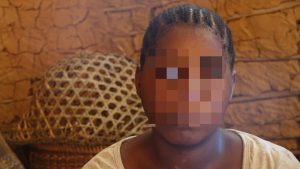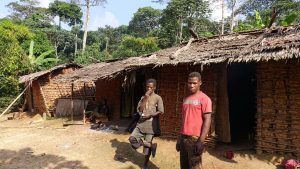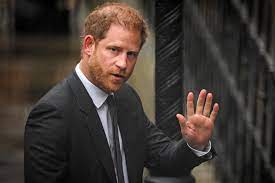The following article written by Steve Topple was first posted by the Canary.
RAPED AND BEATEN: PRINCE HARRY CHARITY LINKED TO HORRIFIC ABUSES IN AFRICA
A charity with strong ties to Prince Harry has been funding rangers responsible for horrific abuses against Indigenous People in the Congo, including torture and rape, according to a major investigation backed by Survival International. It shows large conservation organisations are just another arm of colonialism.
African Parks: systemic abuse allegations
The abuses have taken place in Odzala-Kokoua National Park in the Democratic Republic of the Congo, which is managed by African Parks. Prince Harry is a member of its board of directors, a position to which he was “elevated” in 2023, after having served as the charity’s president for six years.
The investigation has uncovered evidence of countless atrocities committed by African Parks’ “armed militia” against local Baka people. The organisation has known for years that the abuses were taking place, but they have continued unabated. This include rape, attempted drownings, and whippings.
African Parks said in a statement:
We are aware of the serious allegations regarding human rights abuses by eco-guards against local people living adjacent to Odzala-Kokoua national park in the Republic of Congo, which have recently received media attention.
We immediately launched an investigation through an external law firm based on the information we had available, while also urging Survival International to provide any and all facts they had. It’s unfortunate that they have chosen not to co-operate, despite repeated requests, and we continue to ask for their assistance.
We encourage anyone with knowledge of any abuses to report them to us or to the Congolese law enforcement authorities, which will assist with the investigation and ensure that the perpetrators of any abuses are brought to justice.
Survival International says…
However, Survival International has hit back. Fiore Longo, head of Survival International’s conservation campaign, said:
With the arrival of protected areas during colonial times many of the locals have already been evicted. But it’s specifically around 2010, when African Parks took over, that the locals said the violence started being worse than before, because their park rangers would beat them every time they tried to get in the forest – which is their home – to collect medicinal plants, hunt and feed their families.
Longo also said that, regarding African Parks’ claim Survival International wasn’t cooperating:
They are the employer of the rangers and the manager of the parks, and they had the money to conduct their own investigation. It’s not up to us to give them details. It’s their responsibility when we raise a problem to go there and investigate.
The stories from Baka People are horrific.
Prince Harry: what are you doing?
One Baka man said:
African Parks are killing us slowly. We’re suffering so much that we might as well be dead.
Another commented:
The past was far better for us – and the reason is all down to African Parks.
A Baka man, Moyambi Fulbert, quoted in the report, had this message for Prince Harry:
I’d tell him to stop supporting African Parks. He is a powerful man. He eats well and lives well – but we don’t have anything now and it’s all because of African Parks.
The Baka and other hunter-gatherers who have lived in and cared for the Congo Rainforest since time immemorial have seen much of their land stolen and turned into National Parks and other Protected Areas.
They have been pushed out, and now live in dire conditions, landless and dependent on others, or turned into ‘tourist attractions.’
They are banned from entering the rainforest they once called home, while mining, oil, and logging companies, and trophy hunters, are considered “partners” of conservation and allowed to carry on with business as usual. This includes the actions by Price Harry-linked African Parks.
The Baka woman in the below photo was raped by an African Parks ranger. She said “African Parks are very bad people. Everybody who works with them is really bad to us. That man was cruel, he was inhumane”:

Two Baka men from a community who were evicted to make way for Odzala-Kokoua National Park are pictured below. Many people in the village have been beaten or abused by park rangers. “We are afraid that if park rangers see us in the forest they will beat us” they said:

Prince Harry’s conservation organisation: another arm of colonialism
Survival International Director Caroline Pearce said:
African Parks, along with other big conservation organisations like WWF, takes Indigenous land to turn it into militarised parks or reserves – and then their guards attack people like the Baka just for trying to live their lives. Prince Harry can help stop this.
We’re calling on him to step down as a director of African Parks. He needs to distance himself from an organisation that is complicit in evictions and the heinous abuse of Indigenous People.
The organisation’s funders must withdraw their funding until the Baka are allowed to return to the park and their land ownership rights are recognised.
The abuses that the Mail on Sunday has uncovered are being repeated across Africa and Asia – this is not a one-off. The entire conservation model as practiced by the big conservation organisations is built on the theft of Indigenous land, and the dispossession of the people who are its rightful owners – just as in the colonial era. It’s time to decolonise conservation.
_____
The Canary would like to acknowledge that this investigation was by Ian Birrell for the Mail on Sunday – an outlet we have a policy of not generally linking to, due to its right-wing, racist, and inflammatory content. However, on this occasion – and after Birrell noted the issue on social media – we have made an exception. This is not an endorsement of the Mail on Sunday.
Prince Harry has so far not commented.
30.1.24
______________
also see:
EL&SD Coverage of Indigenous Peoples

